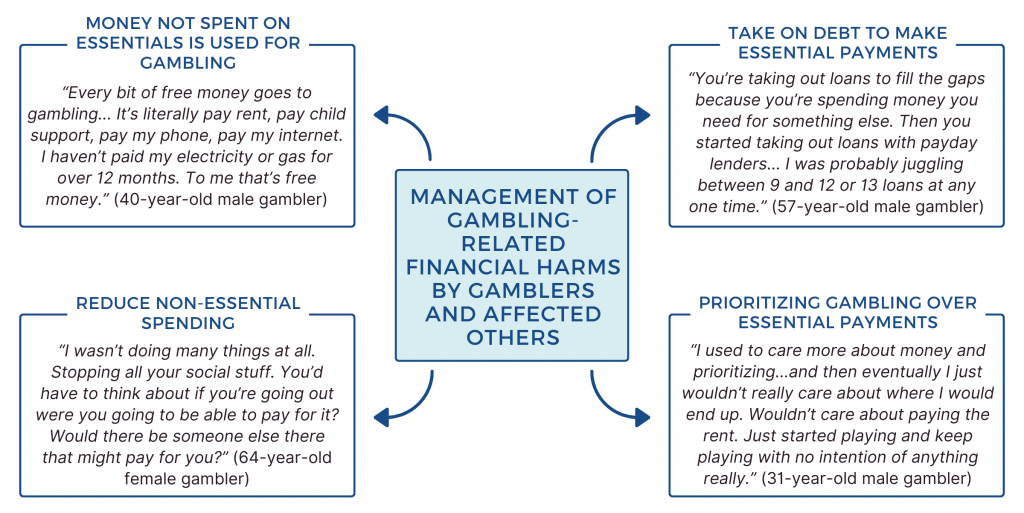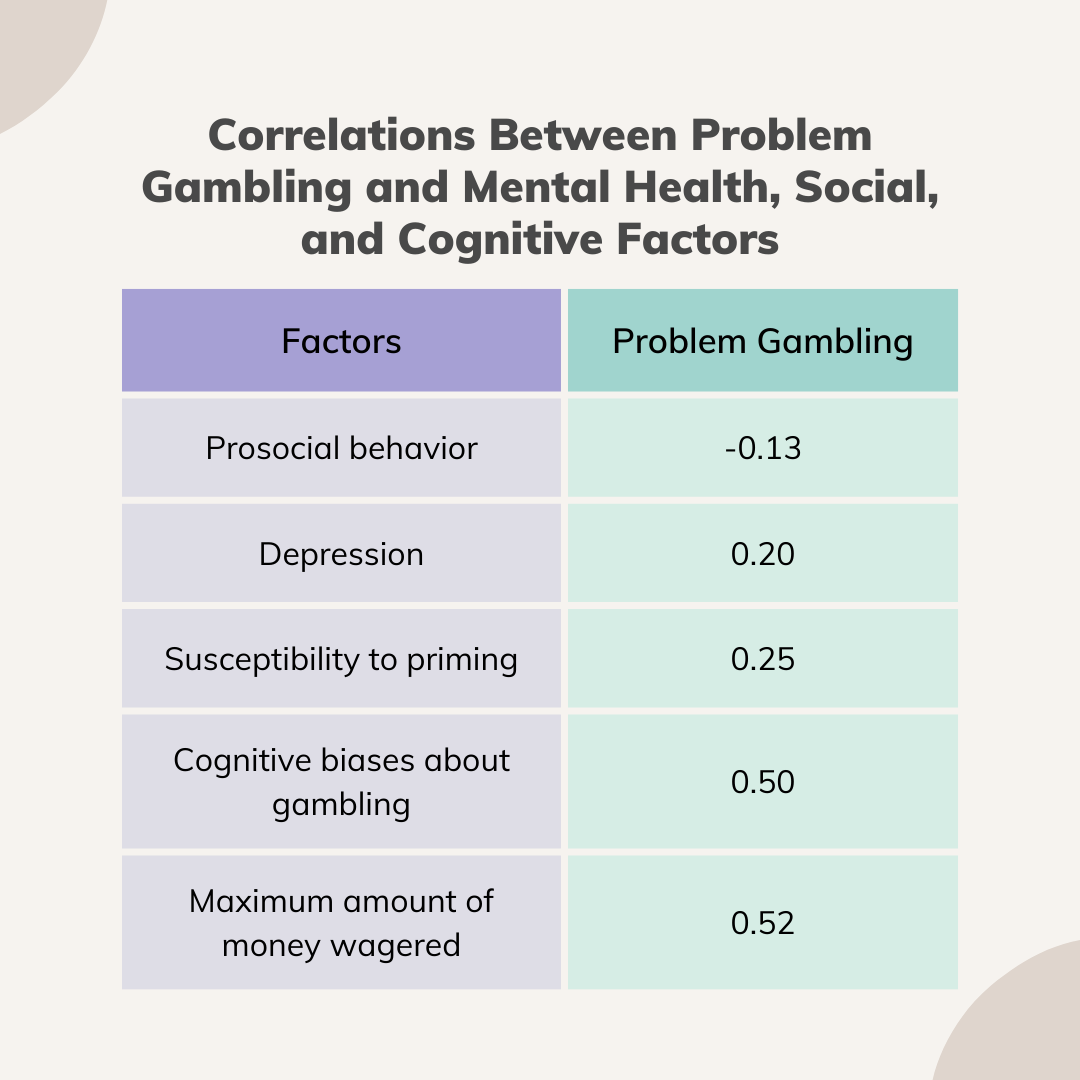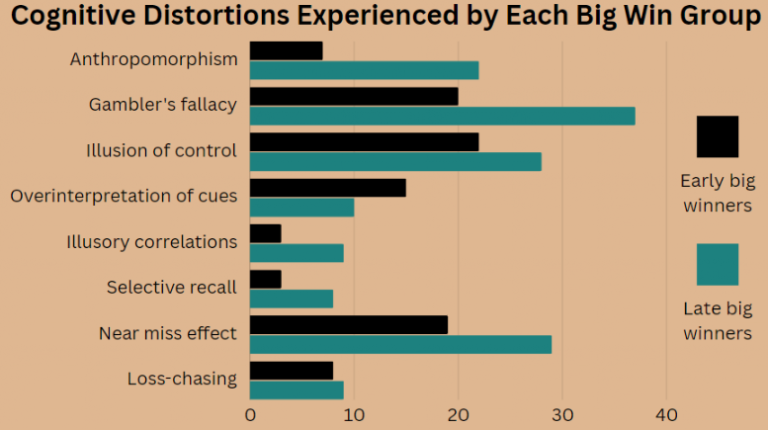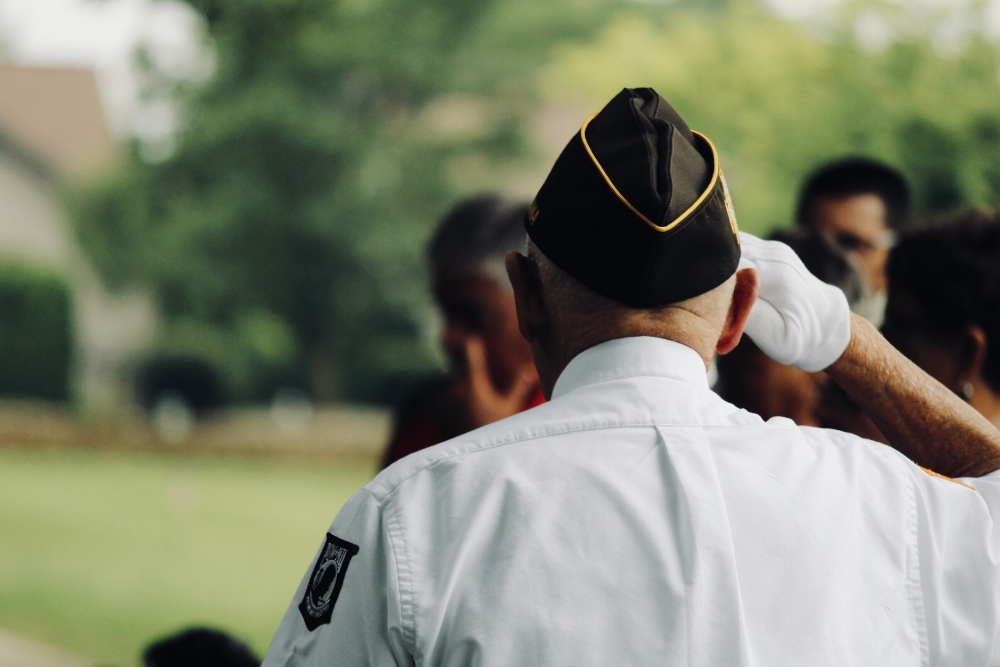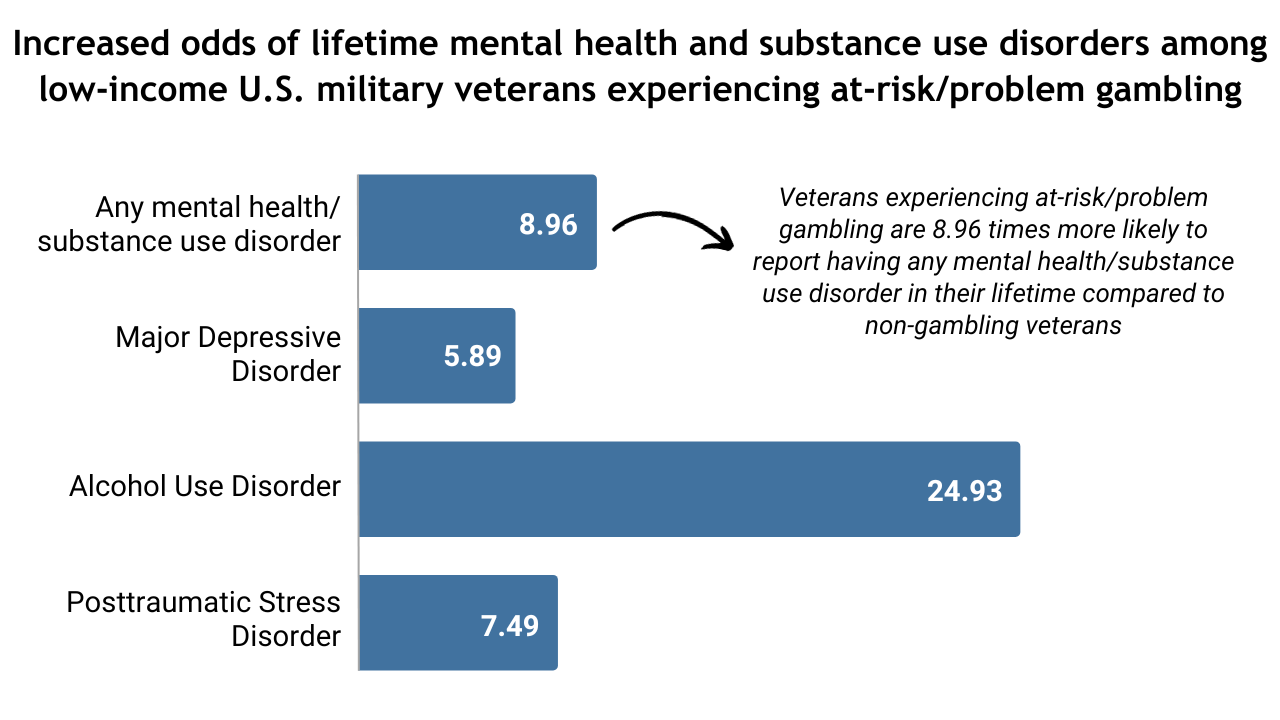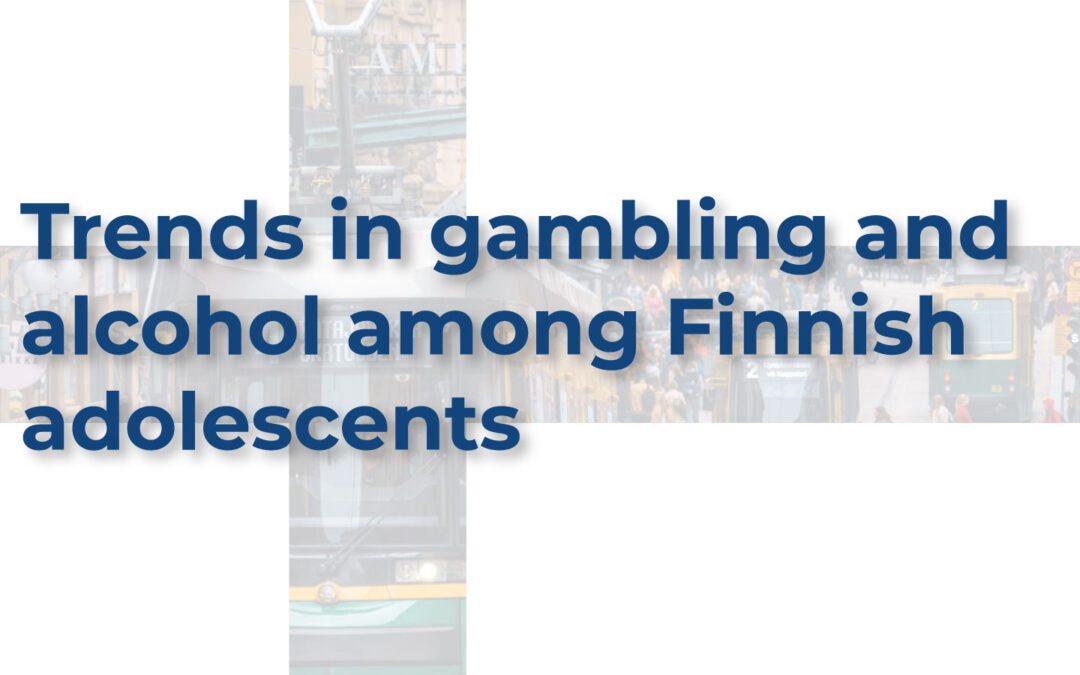
Mar 20, 2024 | RESEARCH
Read the original article on The BASIS Here.
Written by: Annette Siu
Gambling harm is a significant issue among culturally and linguistically diverse (CALD) community members who live in disadvantaged areas in Australia. This problem is exacerbated by the fact that gambling harm assessment options require gamblers to self-disclose to healthcare providers, as CALD community members are less likely to discuss gambling with their providers due to stigma and language barriers. One potential solution is to implement screening for gambling-related problems in primary and community care settings, which could help improve access to Gambling Disorder treatment for CALD community members. This week, The WAGER reviews a study by Andrew Reid and colleagues that examined enablers of and barriers to a pilot study that implemented a gambling harm screening model in primary and community care settings.
What was the research question?
What are some enablers of and barriers to implementing a gambling harm screening model for CALD community members in primary and community care settings?
What did the researchers do?
The researchers implemented a problem gambling screening and referral model in general practice and community-based services in Fairfield, Australia, an area with a large CALD population. The screening model included the Problem Gambling Severity Index short form and the Concerned Others Gambling Screen. If the client screened positive for being at-risk for gambling harm on either measure, the provider would give them a list of gambling help resources for them to read and contact.
Following implementation, the researchers conducted interviews with two general practitioners and seven community workers who administered the screening model with 130 patients. The goal was to learn about factors that facilitated and hindered the implementation of the screening model.
What did they find?
One structural factor that facilitated implementation was alignment with standard consultation procedures (see Figure for key enablers and barriers). Participants indicated that it was easy to integrate the screening model, as it supported their existing holistic patient care approaches. Process-related factors that facilitated implementation included the screening assessment’s online format and short length, which made it easier to administer and increased its accessibility to patients. One social factor that facilitated implementation was increased staff knowledge and empowerment. Participants explained that taking part in the pilot project increased their confidence in discussing gambling with patients and addressing gambling harm.
One structural factor that hindered implementation was a lack of long-term funding, which created uncertainty about the continued development and expansion of gambling interventions (see Figure). One process-related factor that hindered implementation was an unclear referral model. The model only provided patients with a list of resources for them to contact themselves, so providers were not able to adequately support their patients through this process. Finally, a social factor that hindered implementation was the complexity of gambling harm, as some patients seemed to be in greater need of other services, such as mental health and financial services, compared to gambling help services.
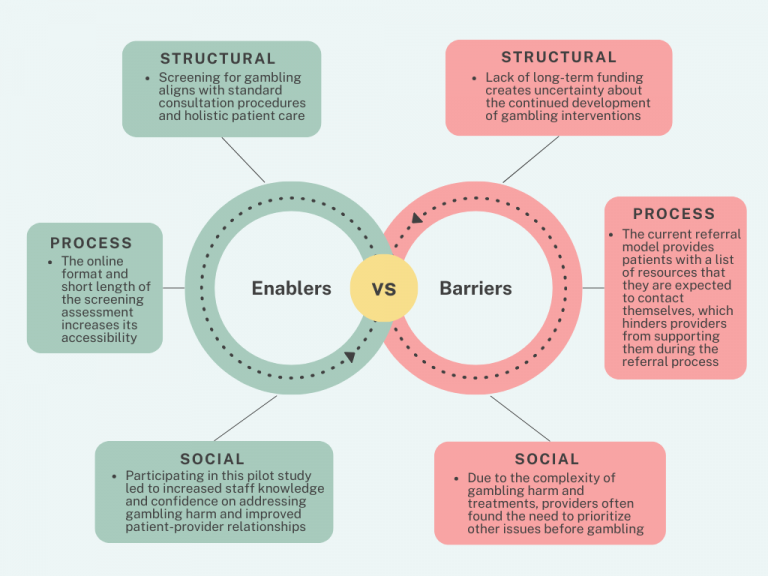
Figure. An overview of key enablers and barriers to the implementation of the gambling harm screening and referral model.
Why do these findings matter?
Integrating problem gambling screening in primary healthcare and community service settings can help to support holistic patient care procedures, increase access to gambling support services, and mitigate gambling harm within communities. Primary care providers who are involved in discussing gambling with their patients can also play a role in reducing stigma related to gambling issues and help-seeking by using person-first, humanizing language. The current study highlights the importance of not only increasing access to gambling harm screening, but also providing support and referring patients to appropriate gambling help resources.
Every study has limitations. What are the limitations in this study?
One limitation is that the researchers only interviewed nine participants who were general practitioners and community workers; they did not interview other people such as practice nurses and practice owners who were also involved in implementing the screening model. Additionally, to better evaluate the effectiveness of the problem gambling screening model, future research should examine the model’s acceptability from the perspective of community members from different cultural backgrounds.
For more information:
Individuals who are concerned about their gambling behaviors or who simply want to know more about problem gambling may benefit from visiting the National Council on Problem Gambling or Gamblers Anonymous. Additional resources can be found at the BASIS Addiction Resources page.
— Annette Siu

Jan 26, 2024 | RESEARCH
Read the original article on The Basis HERE.
By Kira Landauer, MPH
Harms associated with gambling can have significant consequences for the gambler and their loved ones. Financial consequences are common, but little is known about the lived experience of financial harm from gambling. This week, The WAGER reviews a study by Sarah Marko and colleagues that explored how people who have been negatively impacted by their own or someone else’s gambling view and manage the financial risks and harms associated with gambling.
What were the research questions?
(1) How do people who have been negatively impacted by gambling perceive their risk of experiencing gambling-related financial harms?, and (2) How do they manage these financial harms?
What did the researchers do?
The researchers conducted semi-structured interviews with 21 Australian adults (11 men and 10 women) who had been negatively financially impacted by their own gambling (gamblers) or someone else’s gambling (affected others). All participants had experienced housing-related financial problems associated with gambling. They were interviewed about their experiences. The researchers analyzed the interviews for common themes pertaining to financial risks and harms associated with gambling.
What did they find?
Most gamblers and affected others didn’t consider the potential risks of gambling until the monetary losses began impacting their lives, such as their ability to make essential payments like bills or rent. Early experiences of harm were not recognized because gambling was viewed as entertainment and as a social activity. Gamblers and affected others changed their money management behaviors to manage these impacts, including: (1) adjusting financial priorities and spending habits, (2) reducing spending in non-essential areas (e.g., house maintenance, social events), and (3) taking on debt to cover expenses. Some gamblers reached a point where the financial impacts became too unmanageable, and they redirected most of their money to gambling. Financial harms had long-lasting effects, including loss of housing due to eviction or foreclosure and trouble finding stable long-term housing due to factors like poor rental history or bad credit. Many gamblers and affected others tried to maintain an outward appearance of financial stability to conceal the extent of the negative impacts of gambling due to the stigma surrounding gambling problems and debt.

Figure. Quotations about the management of gambling-related financial harms among n =21 gamblers and affected others.
Why do these findings matter?
These findings demonstrate the complexity of gambling-related financial harms experienced by gamblers and affected others. Current messaging around the use of safer gambling strategies might contribute to the notion that gambling harm is something that can be managed by gambling ‘correctly’. It might also reinforce the stigma associated with gambling problems and debt. Public messaging about minimizing financial gambling harms should draw from lived experience and not focus solely on personal responsibility. For example, messaging could depict actual experiences of harm in people’s lives — a strategy used in other areas like tobacco control.
Every study has limitations. What are the limitations of this study?
Most participants were over the age of 40, so these findings might not be generalizable to other age groups. The study only included a small number of affected others, all of whom were women. Their experiences might vary depending on their relationship to the gambler; additional research is needed with a larger and more diverse sample of affected others.

Jan 11, 2024 | RESEARCH
Read the original article on The Basis HERE.
By Annette Siu
People with Gambling Disorder are more likely to experience clinical and health-related problems such as depression. People experiencing problem gambling might also be less likely to engage in prosocial behavior, potentially because they are singularly focused on their own gambling. They might also be more easily “primed” or conditioned by cues (e.g., seeing slot machine symbols, hearing clinking coins or chips) after exposure to positive experiences associated with gambling, which might make them more likely to continue gambling and experience problems. This week, The WAGER reviews a study by Javier Esparza-Reig and colleagues that examined relationships between problem gambling, prosocial behavior, and responses to priming, as well as well-known risk factors (depression and cognitive biases).
What were the research questions?
(1) Is problem gambling negatively associated with prosocial behavior? and (2) Is problem gambling positively associated with depression, susceptibility to priming in general, cognitive biases about gambling, and the maximum amount of money a person has wagered on gambling?
What did the researchers do?
The researchers recruited 258 students aged 18 – 26 from a university in Spain. To measure problem gambling, participants completed a Spanish-language version of the 20-item South Oaks Gambling Screen. Participants reported the maximum amount of money wagered on gambling at a single point in time and also completed measures of depressive symptoms, prosocial behavior, susceptibility to priming, and cognitive biases about gambling. To assess their susceptibility to priming1, participants completed a priming task that involved making decisions about economic issues. The researchers used Pearson correlations to analyze the relationships among these characteristics.
What did they find?
There was a statistically significant negative relationship between problem gambling and prosocial behavior (see Figure). This result indicates that higher levels of problem gambling were associated with lower levels of prosocial behavior. On the other hand, problem gambling was positively associated with depression, susceptibility to priming, cognitive biases about gambling, and maximum amount of money wagered.

Figure. The correlation coefficients for problem gambling and several mental health, social, and cognitive factors. Correlations are ranked from smallest to largest. Values closer to 0 indicate a weaker relationship, while negative values closer to -1 indicate a stronger negative relationship and positive values closer to +1 indicate a stronger positive relationship. All correlations were statistically significant.
Why do these findings matter?
The findings add more evidence to the notion that people with Gambling Disorder may be at increased risk of experiencing other psychopathological conditions, including depression. However, people experiencing problem gambling might also be more susceptible to social problems and priming effects, which can contribute to continued experiences of gambling problems. Thus, it is important to develop comprehensive prevention and intervention programs that include resources for improving social and cognitive wellbeing (e.g., mindfulness), in addition to mental health resources.
Every study has limitations. What are the limitations in this study?
This study was based on a small sample of university students in Spain, so the findings about problem gambling and psychosocial factors might not be generalizable to other demographic groups. The percentage of participants who scored in each range of the South Oaks Gambling Screen was not reported, so it is unclear whether the sample was disproportionately high (or low) in gambling-related problems. This study also primarily used self-report measures, so the results might be affected by social desirability and other biases.
1. Priming refers to being unconsciously influenced to act a certain way after being exposed to a certain prompt or stimulus, such as a word or image. For example, if someone is shown the word “doctor”, they will usually be able to identify more words related to medicine shown immediately after, such as “nurse”, as opposed to other non-medical-focused words. In this case, people experiencing problem gambling might be more susceptible to priming because they might be more strongly influenced by cues or stimuli to gamble, such as lights, sounds or smells associated with gambling.

Nov 29, 2023 | RESEARCH
Read the original article on The BASIS here.
By John Slabczynski
Editor’s Note: Today’s review is part of our month-long Special Series on Addiction Myths and Misinformation. Throughout November, The BASIS is showcasing the dangers of myths and misinformation related to addiction.
People who experience gambling problems often hold irrational beliefs around gambling that encourage further involvement. For example, people who are on a losing streak may continue to gamble due to the belief that they are due for a win after so many losses (the gambler’s fallacy), while the hot hand fallacy can make someone think that wins will continue after a winning streak. Cognitive distortions like these can be rooted in misinterpretations of mathematics and are sometimes part of the constellation of factors that lead to gambling problems. Other factors related to the development of gambling problems, such as experiencing big wins and loss chasing, are closely related to these cognitive distortions. Therefore, understanding how these factors relate to one another is important for intervention and treatment efforts. This week, as part of our Special Series on Addiction Myths and Misinformation, The WAGER reviews a study by Róbert Krébesz and colleagues that examined how people experience cognitive distortions following a big win on a simulated slot machine.
What were the research questions?
(1) How do people experience cognitive distortions while gambling? (2) How do big wins influence the experience of cognitive distortions, and does this influence depend on when the big win occurs?
What did the researchers do?
Fourteen participants aged 18+ who reported that they did not gamble participated in a simulated slot machine experiment. The researchers preprogrammed the first 90 spins on the slot machine to award a big win in either the first 30 spins or between the 30th and 60th spins1. Participants who experienced a big win in their first 30 spins constituted the first group, early big winners, while participants who experienced a big win between their 30th and 60th spins made up the second group, late big winners. Throughout the experiment, participants continuously vocalized their thoughts and emotions out loud. These vocalizations were recorded and transcribed, and made up the primary data for the study. The research team coded these transcripts using a content analysis approach to indicate whether they contained cognitive distortions and if so, which ones.
What did they find?
This sample of non-gamblers displayed several cognitive distortions, including anthropomorphism, the gambler’s fallacy, illusion of control, over-interpretation of cues, illusory correlations, selective recall, near miss effect, and loss-chasing2. Of these, the most common were the gambler’s fallacy (57 occurrences), illusion of control (46 occurrences), and near miss effect (47 occurrences). Notably, cognitive distortions occurred most frequently in the phases where big wins occurred (i.e., the first 60 spins), yet were relatively rare in the final phase where no big win occurred (i.e., the last 30 spins). In terms of the timing of the big win, participants showed some differences in the types of cognitive distortions they experienced depending on when the win occurred (see Figure).

Cognitive distortions emerge following a big win on a simulated slot machine.
Figure. Displays the frequency of each type of cognitive distortion for both early and late big winners (N = 7 in each group). Three additional types of cognitive distortions were coded for, but these distortions (omnipotence, flexible attributes, and superstitious beliefs) were not present in either group.
Why do these findings matter?
These findings are important for two reasons. First, they suggest that cognitive distortions may be an important focus of prevention efforts even for people who have not begun to experience gambling harm. For instance, responsible gambling messages, like pop-up messages that appear on slot machines, remind gamblers about the odds of winning games or suggest that players take frequent breaks. This study suggests a role for correcting cognitive distortions in these messages. Furthermore, the results suggest that pop-ups and other responsible gambling interventions focused on correcting gambling myths and misconceptions might be more effective if administered directly following a big win, such as after a player wins a slot machine jackpot.
Every study has limitations. What are the limitations in this study?
This study was a lab-based experiment and did not require participants to gamble with their own money, so the behavior of participants in this study might differ from the behavior of someone operating in an actual gambling environment. Additionally, the simulated slot machine in this experiment did not include features such as lights and sounds that are common to modern electronic gaming machines. Finally, this was a small study so results need to be replicated with a larger sample.
For more information:
Individuals who are concerned about their gambling may benefit from visiting the National Council on Problem Gambling or through interacting with Gamblers Anonymous. Additional resources can be found at The BASIS Addiction Resources page.

Nov 3, 2023 | RESEARCH
Read the original article on The BASIS here.
By Kira Landauer, MPH
The prevalence of gambling problems is higher among U.S. military veterans when compared to the general civilian population. Aspects of military service — experiences of trauma, difficulty adjusting to life post-deployment, and low social support after returning from deployment — may contribute to the risk of problem gambling among veterans. This week, The WAGER reviews a study by Elina A. Stefanovics and colleagues that examined the associations between recreational gambling and at-risk/problem gambling, and homelessness and mental health/substance use disorders among low-income U.S. military veterans.
What were the research questions?
What is the prevalence of recreational gambling and at-risk/problem gambling among low-income U.S. military veterans? What are the associations between gambling status and physical health, mental health and substance use disorders, and homelessness?
What did the researchers do?
The researchers analyzed survey data from a subset of 781 veterans who completed the National Veteran Homeless and Other Poverty Experiences study. Eligible participants served on active duty in the U.S. Armed Forces and lived in a household under 300% of the federal poverty level in 2021. Study participants reported past-year gambling and were screened for at-risk/problem gambling (i.e., ARPG). They were then categorized into three groups: non-gambling; recreational gambling (i.e., past-year gambling with a negative gambling screen); and ARPG (i.e., past-year gambling with a positive gambling screen).
Participants were also asked about their experiences with homelessness, their income and other financial measures (e.g., debt), their physical health, and their history of mental health and substance use (including treatment). The researchers examined how these measures were associated with gambling group membership.
What did they find?
Nearly one-quarter of the low-income veterans surveyed gambled recreationally, and 6.7% screened positive for ARPG. Individuals in the ARPG group were more likely to be younger and less likely to be White. Compared to non-gambling, ARPG was associated with poorer physical health and current and lifetime mental health and substance use disorders (see Figure). Veterans in the recreational gambling group were more likely to have a current drug use disorder compared to the non-gambling group. ARPG group members were five times as likely to have ever received mental health or substance use treatment and three times as likely to report current psychiatric medication use relative to the non-gambling group. They were also more likely to report shame and perceived stigma as reasons for not seeking mental health treatment. Finally, members of the ARPG group were six times as likely to have a lifetime history of homelessness and five times as likely to report having student loans when compared to non-gambling participants.

Increased odds of lifetime mental health and substance use disorders among U.S military veterans experiencing at risk/problem gambling
Figure. Odds ratios of lifetime mental health and substance use disorders among low-income U.S. military veterans experiencing at-risk/problem gambling, compared to non-gambling veterans.
Why do these findings matter?
This study found that about one-third of low-income U.S. military veterans engage in recreational gambling or are experiencing ARPG, and that ARPG is associated with poor physical health, current and lifetime mental health and substance use disorders, and homelessness. Tailored approaches to identifying and addressing ARPG in this population are needed. Routine screening for gambling-related problems could be implemented across VA primary care and behavioral health centers. Further, VA providers should be equipped to provide problem gambling treatment. Given the high rates of ARPG among veterans with a history of homelessness, shelter staff should be trained to identify ARPG and make appropriate referrals. Finally, veterans might benefit from increased services to help address factors associated with ARPG, such as resources on adjusting to post-deployment life.
Every study has limitations. What are the limitations of this study?
This study utilized a cross-sectional design, so causality between variables cannot be determined. In other words, we cannot determine whether ARPG affected experiences of homelessness among veterans, or vice versa. The findings from this study might not be generalizable to all U.S. veterans (e.g., higher-income or reserve service veterans).
For more information:
Make the Connection is a resource for veterans looking to learn more about and change their gambling behavior. Do you think you or someone you know has a gambling problem? Visit the National Council on Problem Gambling for screening tools and resources. For additional resources, including gambling and self-help tools, visit our Addiction Resources page.
— Kira Landauer, MPH

Oct 12, 2023 | RESEARCH
By Annette Siu
See original article on The BASIS HERE.
Adolescence is a developmental period during which risky behaviors—such as gambling and alcohol use—tend to emerge. In Finland, gambling and alcohol use among underage adolescents is common. Advising adolescents on the potential harms of risky behaviors is important because gambling at an early age is associated with a greater risk of developing addictive behaviors such as problem gambling and alcohol dependence later in life. This week, the WAGER reviews a study by Tiina Latvala and colleagues that examined trends in the relationship between adolescent gambling and alcohol use between genders over time.
What were the research questions?
(1) What trends are there in the relationships between gambling, alcohol use, and drunkenness among Finnish adolescents? and (2) How have these trends changed from 2009 to 2019?
What did the researchers do?
The researchers used data collected biannually from 2009 to 2019 from the School Health Promotion Study (SHPS). The SHPS is a national cross-sectional study that asks 14-16 year olds in Finland about their health behaviors and school experiences. The researchers measured the frequency of gambling and alcohol use by asking the questions, “How often do you gamble?” and, “How often do you use alcohol altogether, e.g., half a bottle of beer or more?” They measured the frequency of drunkenness by asking, “How often do you use alcohol until you are really drunk?”. Among those who used alcohol or got drunk at least once a month, the researchers classified respondents as regular gamblers (gambled at least once a week), occasional gamblers (gambled 2-3 times a week), or non-gamblers, and studied how many respondents fell into these categories each year.
What did they find?
Among boys who reported using alcohol at least once a month, regular gambling became less prevalent over time while occasional gambling and non-gambling became more prevalent. In the first year of data collection, 58.3% of boys who drank at least once a month were regular gamblers, but this number dropped to 20.6% by 2019 (see Figure). Girls who reported using alcohol at least once a month gambled less overall across the study period. Trends were similar for boys and girls who got drunk at least once a month (not shown). Overall, gambling, alcohol use, and drunkenness were more common among boys compared to girls. Gambling was also more common among adolescents who used alcohol or who had gotten drunk compared to those who were not using alcohol or had not gotten drunk.

Figure. This figure displays the proportions of regular gambling, occasional gambling, and no gambling among boys and girls in Finland who reported using alcohol at least once a month from 2009 to 2019.
Why do these findings matter?
Although the prevalence of adolescent gambling decreased over time between 2009 and 2019, there was still a significant proportion of underage adolescents who reported gambling. Additionally, those who used alcohol were also more likely to gamble, which suggests that there is a potential clustering of problems among adolescents. To decrease risky behaviors among adolescents, it is important to address social determinants of health through preventive interventions at the individual, community, and societal levels. Potential interventions include stricter enforcement of gambling policies, increasing education about potential harms resulting from risky behaviors among youth, and more.
Every study has limitations. What are the limitations in this study?
This study was conducted in Finland, so the findings about adolescent gambling and alcohol use might not be generalizable to other countries with different gambling regulations and attitudes. Additionally, because this study used self-report measures, the responses might be impacted by social desirability bias.
For more information:
Individuals who are concerned about their gambling behaviors or simply want to know more about problem gambling may benefit from visiting the National Council on Problem Gambling. The National Institute on Alcohol Abuse and Alcoholism has tips and resources for people struggling with problem drinking. Additional resources can be found at the BASIS Addiction Resources page.
Page 5 of 11« First«...34567...10...»Last »




